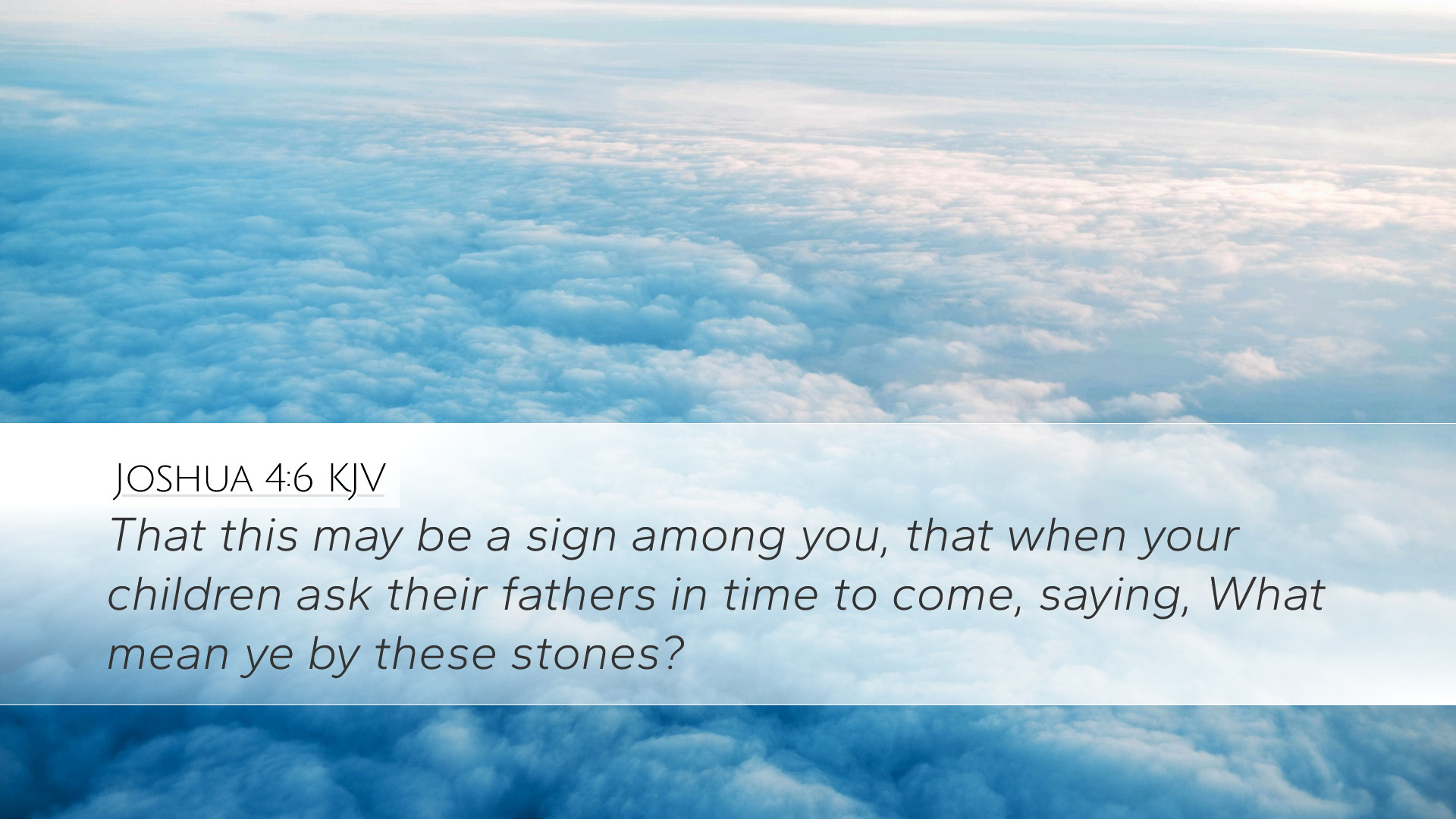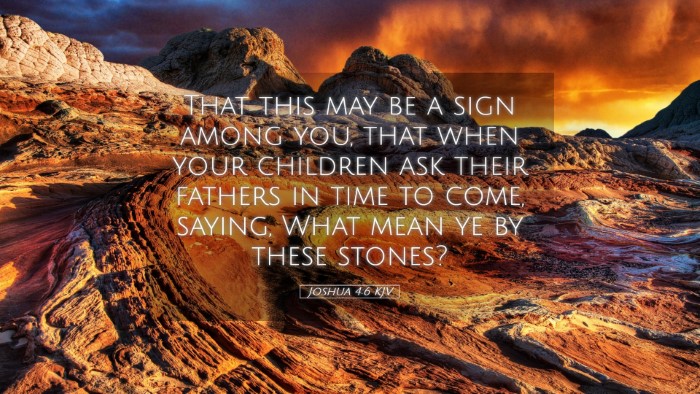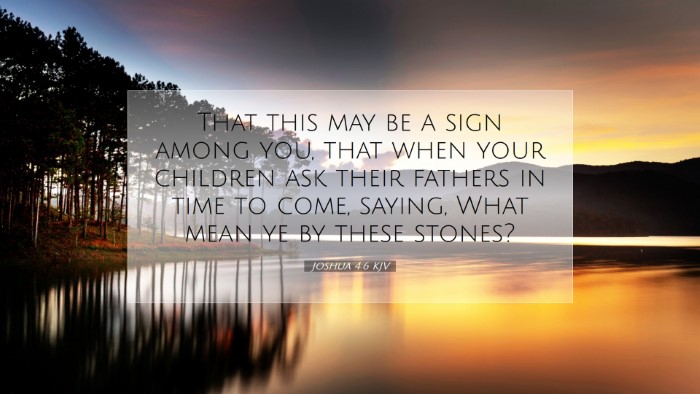Old Testament
Genesis Exodus Leviticus Numbers Deuteronomy Joshua Judges Ruth 1 Samuel 2 Samuel 1 Kings 2 Kings 1 Chronicles 2 Chronicles Ezra Nehemiah Esther Job Psalms Proverbs Ecclesiastes Song of Solomon Isaiah Jeremiah Lamentations Ezekiel Daniel Hosea Joel Amos Obadiah Jonah Micah Nahum Habakkuk Zephaniah Haggai Zechariah MalachiJoshua 4:6
Joshua 4:6 KJV
That this may be a sign among you, that when your children ask their fathers in time to come, saying, What mean ye by these stones?
Joshua 4:6 Bible Commentary
Bible Commentary on Joshua 4:6
Verse: "That this may be a sign among you, that when your children ask their fathers in time to come, saying, What mean ye by these stones?" (Joshua 4:6)
Introduction
The passage of Joshua 4:6 marks an important moment in the history of Israel as they transitioned into the Promised Land. This verse serves not only as a historical note but also as a profound theological reminder of the significance of divine acts and the importance of teaching future generations about God’s faithfulness.
Contextual Background
Following their Exodus from Egypt, the Israelites faced numerous challenges during their wilderness wanderings. As they finally crossed the Jordan River into Canaan, God commanded them to set up memorial stones to commemorate this miraculous event. This served both a practical purpose of remembrance and a spiritual one of testimony to God’s providence.
The Significance of Memorials
Matthew Henry emphasizes that memorials are essential in the life of faith. They serve to anchor the community in their history with God, offering a physical reminder of God’s interventions. The stones erected at Gilgal represent a tangible witness to God's miraculous power and faithfulness.
Albert Barnes elaborates on the teaching aspect highlighted in the verse. He explains the necessity of maintaining awareness of God’s deeds, as they serve to inspire faith and obedience in both the current and subsequent generations. Barnes points to the natural curiosity of children, suggesting that these stones would prompt questions that, in turn, would lead to significant teaching moments about God’s greatness.
Generational Teaching
Adam Clarke provides insights into the pedagogical role of the stones. He highlights the importance of passing down stories of faith from one generation to the next. The phrase "What mean ye by these stones?" indicates an intentional scheme of remembrance; parents are tasked with communicating the meaning and significance of their faith history. Clarke stresses that this is not merely an obligation but a privilege to share the story of God’s covenant with His people.
The Role of Curiosity
The inquisitive nature of children is crucial in understanding this verse. The stones are not just relics but catalysts for learning. This idea is supported by several commentaries; Henry suggests that a child’s question is an opportunity for adults to share deeper truths about faith, historical events, and God’s character. This dynamic reinforces the importance of fostering a questioning spirit in the faith community.
Theological Implications
This verse invites deeper theological reflection on how memory plays a role in worship and community identity. Barnes points out that memorials were integral in Old Testament worship, serving as points of connection to God’s actions in history. Such memorials inform the community’s understanding and relationship with God.
Moreover, Clarke reflects on how these stones also symbolize the continuity of God’s promises. They serve as a bridge linking past events to future expectations, fostering hope and faith in God’s ongoing narrative with His people.
Practical Applications for Today
Modern readers and leaders can glean valuable lessons from Joshua 4:6. The act of establishing memorials—whether physical objects, rituals, or traditions—enhances spiritual formation within families and church communities. Engaging children in conversations about faith heritage can deepen their understanding and commitment to God.
- Encourage Family Stories: Parents should share personal testimonies of God’s faithfulness.
- Create Reminders: Churches can establish annual traditions or visual reminders that celebrate significant spiritual milestones.
- Facilitate Discussions: Church leaders ought to encourage open dialogues about faith, allowing questions that lead to deeper understanding.
Conclusion
Joshua 4:6 serves as a profound reminder of the importance of both remembering God's mighty acts and the responsibility of each generation to pass on their faith to the next. The insights gleaned from the works of Matthew Henry, Albert Barnes, and Adam Clarke help to illuminate the multifaceted nature of this verse. It highlights the endless cycle of questioning, teaching, and proclaiming the goodness of God throughout generations.


